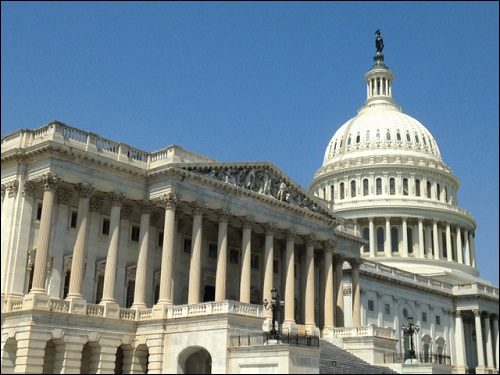House Speaker Paul Ryan said Congress will probably need to extend current-year funding of most government operations before the new budget year begins Oct. 1, an action that could delay another year of scheduled increases in highway funding.
Ryan made the remarks to reporters while visiting Intel Corp. in Portland, Ore., on Aug. 23.
Amid speculation on how much Congress can accomplish when it returns next month from a summer recess, before the Sept. 30 end of the fiscal year, he said that “given the time of year it is and the rest of the appropriations we have to do, we’re going to need more time to complete our appropriations process, particularly in the Senate. So that’s something that I think we all recognize and understand, that we’re going to have to have some more time to complete our appropriations process.”
Politico reported that he was specifically asked if that meant Congress would need to pass a continuing resolution, which would extend 2017 funding to whenever lawmakers can negotiate and pass a final 2018 appropriations package. “I think that will probably be necessary, yes, because I can’t imagine the Senate will be able to process the appropriations bill as quickly as the House is,” Ryan said.
That scenario could leave state departments of transportation drawing their Highway Trust Fund formula allocations at past-year levels, but prevent them receiving scheduled increases at a time that many are drawing up their project plans and bid schedules for the coming year.
Lawmakers in the five-year, 2015 Fixing America’s Surface Transportation Act had both authorized and fully funded annual increases in disbursements to state DOTs for highway programs. However, Congress must also approve the yearly hikes in appropriations bills for the Department of Transportation, and so far has not passed one for the coming fiscal 2018.
Congress in the FAST Act also authorized annual increases for formula transit disbursements, except for 2018, when transit appropriations are already scheduled to continue at 2017 levels.
Unless lawmakers complete a DOT funding bill by Sept. 30 or include DOT appropriations in a larger bill to fund federal agencies, the USDOT would be included in a broad continuing resolution that freezes government funding at 2017 levels until Congress can complete action on a final funding measure.
Such a delay took place last year, when the first scheduled FAST Act increase in highway and transit funding was scheduled to take effect on Oct. 1. Congress passed a series of CRs that extended 2016 funding levels into the first months of the Trump administration, and only completed a 2017 budget bill in April.
That delayed about $1 billion in formula disbursements to state DOTs while they were planning spring and summer mobility projects, and delayed hundreds of millions of dollars to transit agencies.
It also contributed to delaying about $1.2 billion of 2017 federal transportation infrastructure grants into 2018 – counting roughly $700 million of freight-related project grants under the FAST Act and $500 million in TIGER infrastructure grants that Congress approved out of general funds.
So far the USDOT has not solicited project applications for this year’s TIGER grants, and it delayed most of the other grant awards by combining them with scheduled 2018 grant funds under a redesigned program now called INFRA.


